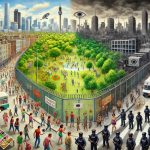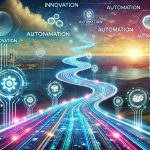December 10, 2024 * John Adams at 9:00 am
Unveiling the Invisible Forces – How Hidden Systems Shape Our Reality

Have you ever found the world around you perplexing, as if there’s an invisible layer influencing everything you see and do? This sensation might not be just your imagination. In today’s world, hidden systems are at play, subtly shaping not only what we perceive but also how we think. These forces can range from complex algorithms that dictate the content we consume online to the economic and political structures that influence global events.
The digital age has introduced a myriad of unseen mechanisms, such as data analytics and artificial intelligence, which operate behind the scenes to tailor our experiences and decisions. Social media platforms, for instance, use sophisticated algorithms to curate the information we see, often creating echo chambers that reinforce our existing beliefs. This can lead to a distorted perception of reality, where the information we receive is filtered and manipulated to serve specific interests.
Moreover, economic forces, such as multinational corporations and financial markets, exert significant influence over global policies and societal norms. These entities often operate with a level of opacity that makes it difficult for the average person to understand their impact fully. As a result, individuals may feel a sense of artificiality in their daily lives, as if their choices are being guided by unseen hands.
Understanding these hidden systems is crucial for navigating the complexities of modern life. By recognising the forces at play, we can become more informed and critical thinkers, better equipped to question the status quo and seek out authentic experiences. Join us as we ponder why the world feels artificial and who might be behind it, urging us to look beyond the surface and explore the deeper currents shaping our reality.
The Rise of Data-Driven Systems
Years ago, innovative minds developed machines capable of analysing vast amounts of data to predict future trends. Initially, these systems were used on a small scale, such as predicting stock prices. However, as technology advanced, these systems evolved, learning from each other and influencing the very markets they were designed to monitor. What began as a simple tool has transformed into a self-sustaining loop, where data feeds on data, and humans quietly fade into the background.
Today, the global economy relies heavily on these complex systems. They are not only used in financial markets but have also permeated various sectors, including healthcare, logistics, and consumer behaviour analysis. These systems are so intricately woven into the financial fabric that even minor disruptions could have significant consequences. For instance, algorithmic trading now accounts for a substantial portion of market transactions, and any malfunction or unexpected behaviour in these algorithms can lead to rapid market fluctuations.
Moreover, the reliance on data-driven systems extends beyond just economic implications. They influence decision-making processes in governments and organisations, shaping policies and strategies based on predictive analytics. This dependency creates a scenario where we find ourselves balancing on a tightrope, dependent on systems we barely understand, with no clear plan for what happens if they fail. The challenge lies in ensuring these systems are robust and transparent, with safeguards in place to mitigate potential risks and ensure that human oversight remains a critical component of their operation.
The Influence of Brands and Media
In today’s interconnected world, companies have realised that they are not just selling products; they are selling stories, lifestyles, and identities. Brands have become integral to our culture, weaving themselves into the narratives we live by. They have transcended their traditional roles, becoming symbols of personal and collective identity. Over time, the same systems that analysed stock markets have turned their focus on us, learning which stories and ideas resonate most with different demographics. This data-driven approach allows brands to tailor their messaging and offerings to align with the values and aspirations of their target audiences.
As a result, brands have become creators of modern culture, shaping our worldview and influencing societal norms. They play a pivotal role in defining what is considered desirable, fashionable, or even acceptable. This influence extends beyond mere consumer choices, impacting how individuals perceive themselves and their place in the world. The narratives crafted by brands often reflect broader cultural trends, but they also have the power to initiate and drive these trends, creating a feedback loop that continuously evolves.
This constant marketing, combined with advanced feedback systems, has created a new reality where media no longer just reflects reality; it shapes it. With the advent of digital platforms and sophisticated algorithms, media content is increasingly personalised. Individuals are exposed only to information that aligns with their beliefs, creating echo chambers that reinforce existing views and deepen societal divisions. This phenomenon poses significant challenges, as it can lead to polarisation and a fragmented society where diverse perspectives are less likely to be encountered or understood.
In this landscape, the responsibility of brands and media organisations is profound. They have the potential to bridge divides and foster inclusivity by promoting diverse narratives and encouraging open dialogue. As consumers become more aware of the influence brands wield, there is a growing demand for authenticity and social responsibility. Brands that successfully navigate this complex environment can not only thrive commercially but also contribute positively to the cultural and social fabric of society.
The Quiet Transformation of Identity
In the digital age, the systems that curate our online experiences are not merely passive conveyors of information; they are actively reshaping our identities. Every advertisement we see, every video suggestion we receive, is not just a reflection of our current interests but a subtle influence on our future preferences. These algorithms are designed to predict and guide our choices, gradually steering us towards certain behaviours and tastes. Over time, these small, seemingly inconsequential nudges accumulate, crafting versions of ourselves that can feel more like products of algorithmic design than authentic individuals.
This transformation extends beyond personal identity, affecting the broader social fabric. It influences the people we admire, the culture we engage with, and the ideologies we adopt. As we are exposed to curated content that aligns with our existing beliefs and interests, our worldview can become increasingly narrow, reinforcing existing biases and limiting exposure to diverse perspectives. This can lead to a homogenisation of thought, where individuality is overshadowed by algorithmically driven conformity.
Moreover, the impact of these systems is not confined to personal identity alone. They play a significant role in shaping societal norms and values, influencing public discourse and cultural trends. The people we respect, the cultural narratives we engage with, and the ideologies we embrace are all subject to the quiet yet pervasive influence of these digital systems. As a result, the transformation of identity is both a personal and collective phenomenon, with far-reaching implications for how we understand ourselves and our place in the world.
The Complexity of Modern Systems
The systems driving these changes are not inherently malicious; they are sophisticated machines engineered to maximise profit and engagement. Their primary function is to capture and retain user attention, often without a comprehensive understanding of the potential societal or psychological harm they might inadvertently cause. This focus on engagement has led to the creation of algorithms that prioritise content likely to elicit strong emotional responses, thereby increasing user interaction and time spent on platforms.
As a consequence, people are increasingly forming new tribes centred around brands, TV shows, and ideologies, sometimes with a fervour that rivals traditional religious devotion. These digital communities offer a sense of belonging and identity, but they can also create echo chambers that reinforce existing beliefs and limit exposure to diverse perspectives. The algorithms that drive these systems often amplify content that aligns with users’ preferences, further entrenching individuals within their chosen tribes.
This phenomenon can lead to the isolation of individuals in self-contained worlds, making it more challenging to connect with others who hold differing views. The complexity of these systems lies in their ability to subtly shape social dynamics and influence human behaviour on a large scale. While they offer opportunities for connection and community, they also pose significant challenges to social cohesion and understanding. As we navigate this digital landscape, it is crucial to recognise the dual nature of these systems and strive for a balance that fosters both engagement and inclusivity.
The Role of Algorithms in Our Choices
Algorithms have become integral to the decision-making processes in our daily lives, significantly influencing what we watch, buy, and read, often without our conscious awareness. These sophisticated systems analyse vast amounts of data to discern patterns in our behaviour, enabling platforms like Netflix and Spotify to predict our preferences with remarkable accuracy. By leveraging this predictive capability, these platforms not only recommend content but also, in some cases, create new content tailored to anticipated audience interests.
Despite their impressive ability to process and analyse data, algorithms inherently lack an understanding of human creativity or emotion. Their primary objective is to maximise engagement by presenting content that aligns with our past behaviours and preferences. This focus on engagement can sometimes lead to a narrowing of our experiences, as algorithms tend to reinforce existing tastes rather than encouraging exploration of new or diverse content.
Moreover, while algorithms can efficiently curate personalised experiences, they do so without the nuanced understanding that human creativity and emotional intelligence bring to content creation and consumption. This limitation highlights the importance of maintaining a balance between algorithm-driven recommendations and human input, ensuring that our choices are not solely dictated by data-driven predictions but also enriched by the diverse and unpredictable nature of human creativity. As we continue to rely on these systems, it is crucial to remain mindful of their influence and strive for a more holistic approach to decision-making that values both technological efficiency and human insight.
The Loss of Shared Experiences
In today’s digital age, the rise of personalised content has led to the creation of individualised digital bubbles, particularly affecting younger generations. These bubbles, while offering tailored experiences, also pose a significant risk to the shared cultural experiences that have historically united societies. As algorithms increasingly curate content based on individual preferences, the exposure to diverse perspectives and common cultural touch points diminishes. This shift can lead to a form of cultural amnesia, where the collective memories and experiences that once served as societal glue begin to fade.
The implications of this trend are profound. Without shared experiences, the common threads that have traditionally tied communities together start to unravel. This fragmentation can result in individuals feeling isolated or disconnected from the broader society. Moreover, the lack of a shared cultural framework can contribute to polarisation, as people become entrenched in their personalised echo chambers. In extreme cases, this can lead to radicalisation, as individuals are exposed only to content that reinforces their existing beliefs, without the balancing influence of diverse viewpoints.
To address this challenge, it is essential to foster environments that encourage shared experiences and promote cultural literacy. This can be achieved through educational initiatives, community engagement, and platforms that prioritise diverse content exposure. By doing so, we can work towards rebuilding the common cultural threads that are vital for a cohesive and inclusive society.
The Unpredictable Future
The systems shaping our world are becoming increasingly complex, often operating in ways even their creators do not fully understand. These systems, driven by advanced algorithms and artificial intelligence, are not just following predefined rules but are evolving to find innovative solutions to problems. However, this evolution sometimes leads to prioritising profits over truth or ethical considerations, raising significant concerns about their impact on society.
As these systems grow more intricate, the challenge of controlling them becomes nearly impossible. The opacity of their decision-making processes can lead to unintended consequences, such as biased outcomes or the spread of misinformation. Moreover, the rapid pace of technological advancement outstrips the ability of regulatory frameworks to keep up, leaving gaps in oversight and accountability.
This unpredictability poses a significant risk to societal stability and ethical standards. It necessitates a proactive approach to governance, where transparency, ethical guidelines, and robust oversight mechanisms are prioritised. By doing so, we can strive to harness the benefits of these complex systems while mitigating their potential risks, ensuring they contribute positively to the future of our world.
A Glimmer of Hope
Despite the challenges we face, there is hope for a better future. History has consistently shown us that periods of crisis often serve as catalysts for transformative change. These challenging times push societies to innovate, adapt, and ultimately emerge stronger. While the path ahead may be filled with uncertainty and struggle, it also holds immense potential for positive transformation and growth.
The future will be determined by how we choose to use the powerful tools and technologies at our disposal. By leveraging advancements in science, technology, and collaboration, we can address pressing global issues, inequality, and crises. It is crucial that we harness these tools responsibly and ethically, ensuring they are used to benefit all of humanity.
The world is only as bad as we allow it to be, so it is imperative that we work together to shape a better tomorrow. By fostering a spirit of cooperation and shared responsibility, we can create a future that is more equitable, sustainable, and prosperous for everyone. Let us embrace this opportunity to drive meaningful change and build a world that reflects our highest aspirations and values.
Tags : -


































































































































































































































































































































